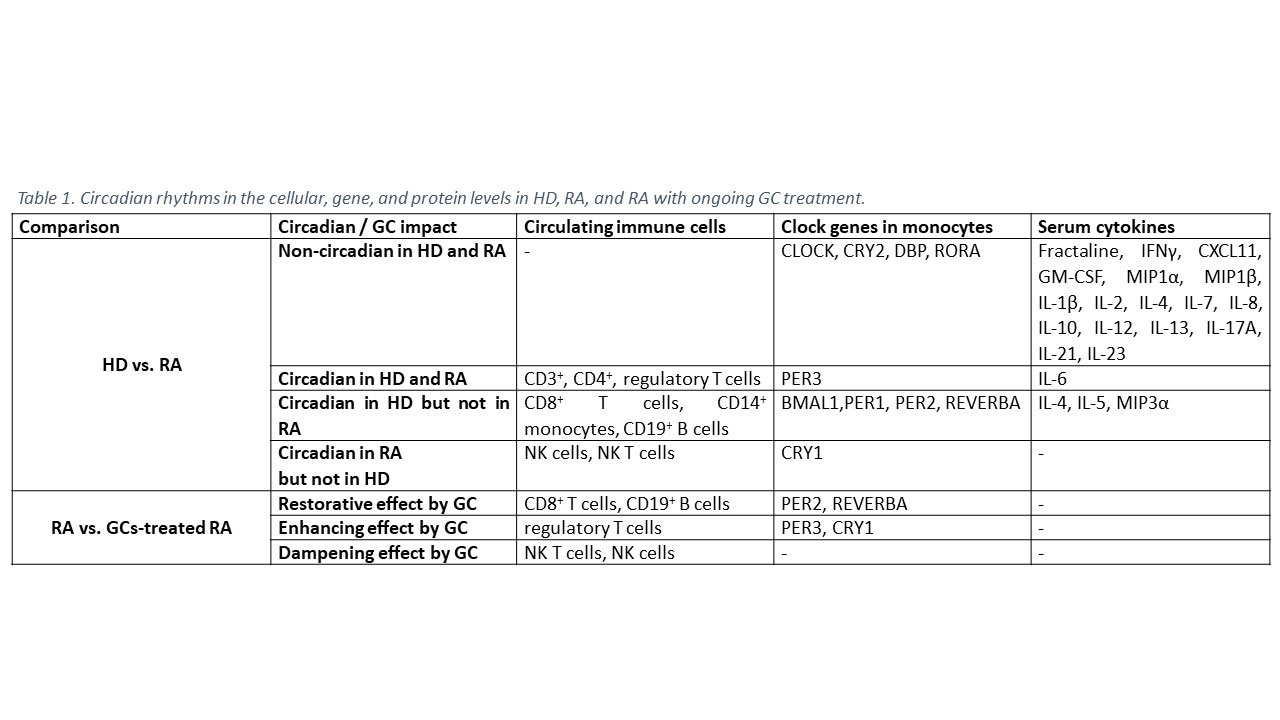Session Information
Session Type: Poster Session B
Session Time: 9:00AM-10:30AM
Background/Purpose: Clinical symptoms of rheumatoid arthritis (RA), including pain, joint stiffness, and swelling, exhibit a distinct circadian rhythm that exacerbates in the early morning in most patients. This is primarily attributed to the circadian variation of the key pro-inflammatory cytokines IL-6 and TNFα, which peak before the worsening of symptoms. Synthetic glucocorticoids (GCs) are among the most commonly prescribed medications for RA. GCs affect the vast majority of immune cells. GCs inhibit the expression of numerous cytokines, such as IL-1, TNFα, and IL-6. GCs are also known to influence the circadian rhythms of immune cells. For instance, they regulate the rhythm of circulating CD4+ and CD8+ T cells via CXCR4. For optimization of diagnosis and treatment strategies for RA, we performed a clinical study comparing the circadian rhythms of healthy donors (HD) and patients with RA. In addition, we investigated the effect of GC treatment on the circadian immune rhythms of RA patients.
Methods: We recruited 12 HD and 13 patients (female, post-menopausal) with active RA (DAS28≥4.0) of whom 5 had ongoing treatment with GCs. A week prior to the study day, their biological clocks were synchronized through a scheduled sleep and mealtime routine. On the study day, they were provided with regular meals, permitted to consume snacks ad libitum, and engaged in passive activities. We collected blood samples every two hours for 24 hours. Using TruCount (flow cytometry), qPCR, and a multiplex suspension assay, the absolute number of circulating immune cells, clock gene expression in monocytes, and serum cytokine levels were assessed, respectively.
Results: Circadian rhythms of regulatory T cells were shifted and the number was substantially lower in RA (Table 1). CD8+ T cells, CD14+ monocytes, and CD19+ B cells lost their rhythms in RA, but these were restored in patients with GC treatment. NK and NK T cells, which were not circadian in HD, displayed “inflammatory circadian rhythms” in RA. In GC-treated patients, these rhythms were diminished. In monocytes, gene expressions of BMAL1, PER1, PER2, and REVERBA were circadian in HD but not in RA. Rhythms of PER2 and REVERBA were restored in GC-treated patients. CRY1 expression exhibited diurnal variation in RA but not in HD. Serum IL-6 exhibited circadian rhythms in both groups, and GC therapy had no discernible effect on IL-6. Serum IL-4, IL-5, and MIP3α were circadian in HD but not in RA patients. The following cytokines were notably elevated in RA-patients: IFNγ, MIP1α, MIP1β, IL-1β, IL-2, IL-17A, and IL-21. GC reduced the expression of IL-10 significantly in RA.
Conclusion: In patients with RA, we observed altered circadian rhythms and the emergence of “inflammatory rhythms”. We demonstrated that GC treatment in non-responder patients resulted in three distinct effects on the circadian rhythms of immune cells: restoration, amplification, and attenuation. In conclusion, these findings offer novel insights into the pathophysiology of circadian rhythms in RA, which could be used to optimize diagnosis and treatment. The limitations of this study include a small sample size and gender-biased samples. Cortisol and melatonin measurements are impending.
To cite this abstract in AMA style:
Wilantri S, Strehl C, Abdirama D, Gaber T, Biesen R, Buttgereit F. Altered Immunological Circadian Rhythms and the Effect of Treatment with Glucocorticoids on Circadian Rhythms of Immune Cells in Patients with Rheumatoid Arthritis: Bring Back the Rhythm [abstract]. Arthritis Rheumatol. 2022; 74 (suppl 9). https://acrabstracts.org/abstract/altered-immunological-circadian-rhythms-and-the-effect-of-treatment-with-glucocorticoids-on-circadian-rhythms-of-immune-cells-in-patients-with-rheumatoid-arthritis-bring-back-the-rhythm/. Accessed .« Back to ACR Convergence 2022
ACR Meeting Abstracts - https://acrabstracts.org/abstract/altered-immunological-circadian-rhythms-and-the-effect-of-treatment-with-glucocorticoids-on-circadian-rhythms-of-immune-cells-in-patients-with-rheumatoid-arthritis-bring-back-the-rhythm/

